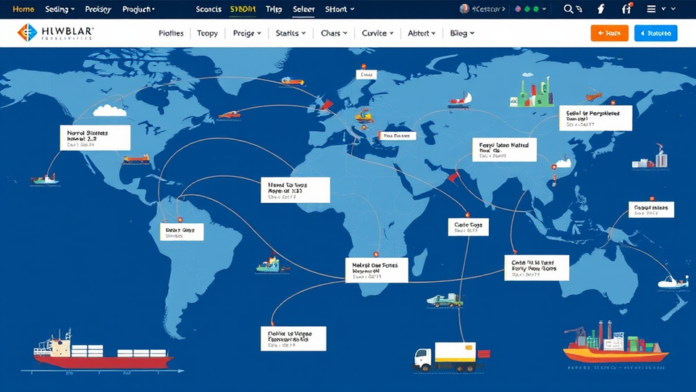Introduction to Global Supply Chain Disruptions
Definition and Overview
Global supply chain disruptions refer to significant interruptions in the flow of goods and services across international borders. These disruptions can arise from various factors, including natural disasters, geopolitical tensions, and pandemics. Such events can lead to delays, increased costs, and shortages of essential products. Businesses often struggle to adapt to these sudden changes. It is crucial for them to understand the underlying causes. Awareness can help mitigate risks. Supply chain resilience is vital for maintaining operational efficiency. Every business should evaluate its supply chain strategy.
Historical Context and Recent Events
Historically, global supply chains have evolved significahtly, driven by advancements in technology and trade agreements. These developments have facilitated faster and cheaper movement of goods. However, recent events, such as the COVID-19 pandemic, have exposed vulnerabilities in these systems. Many businesses faced unprecedented challenges during this time. It was a wake-up call for many. Additionally, geopolitical tensions have further complicated international trade. Understanding these dynamics is essential for effective planning. Every business must adapt to changing conditions.
Causes of Supply Chain Disruptions
Natural Disasters and Climate Change
Natural disasters and climate change significantly impact supply chains, disrupting logistics and production. These events can lead to unexpected delays and increased costs. For instance, hurricanes can damage infrastructure, halting transportation routes. This creates a ripple effect across industries. Additionally, climate change contributes to resource scarcity, affecting raw material availability. Companies must assess their vulnerability to these risks. Proactive measures are essential for resilience. Every business should prioritize risk management strategies.
Geopolitical Tensions and Trade Policies
Geopolitical tensions and trade policies can severely disrupt supply chains, creating uncertainty in global markets. Tariffs and sanctions often lead to increased costs for businesses. This can result in higher prices for consumers. Additionally, trade disputes may cause delays in the movement of goods. Companies must navigate these complexities to maintain competitiveness. Strategic planning is essential for mitigating risks. Every business should stay informed about policy changes.
Impact on Global Trade and Economy
Effects on Import and Export Dynamics
Supply chain disruptions significantly affect import and export dynamics, altering the flow of goods between countries. These changes can lead to increased costs and longer delivery times. Consequently, businesses may struggle to meet consumer demand. This situation can create market volatility, impacting economic stability. Companies must adapt their strategies to navigate these challenges. Awareness of global trends is crucial for informed decision-making. Every business should evaluate its supply chain resilience.
Influence on Inflation and Pricing Strategies
Supply chain disruptions can lead to inflationary pressures, as increased costs are often passed on to consumers. This results in higher prices for essential goods. Businesses may need to adjust their pricing strategies to remain competitive. Such adjustments can affect consumer purchasing behavior. Understanding these dynamics is vital for effective financial planning. Every business should monitor market trends closely. Awareness can help mitigate potential losses.
Sector-Specific Implications
Manufacturing and Production Challenges
Manufacturing and production face significant challenges due to supply chain disruptions. Key issues include material shortages, labor constraints, and increased operational costs. These factors can lead to delays in product delivery. Companies may struggle to maintain quality standards.
Understanding these challenges is essential for strategic planning. Every business must adapt to these realities. Awareness is crucial for success.
Retail and Consumer Goods Adjustments
Retail and consumer goods sectors must adapt to supply chain disruptions. These adjustments include changing inventory management practices and revising pricing strategies. Companies may need to diversify suppliers to ensure product availability. This can help mitigate risks associated with shortages.
Such strategies are essential for maintaining competitiveness. Every retailer should evaluate their approach. Awareness leads to better determination-making.
Strategies for Businesses to Mitigate Risks
Diversification of Supply Sources
Diversification of supply sources is crucial for businesses aiming to mitigate risks associated with supply chain disruptions. By sourcing materials from multiple suppliers, companies can reduce dependency on a single source. This strategy enhances resilience against unforeseen events. Additionally, businesses should consider regional diversification to minimize geopolitical risks.
Implementing these strategies can lead to improved operational stability. Every business should prioritize supply chain flexibility. Awareness fosters proactive risk management.
Investment in Technology and Automation
Investment in technology and automation is essential for businesses seeking to mitigate supply chain risks. By adopting advanced systems, companies can enhance efficiency and reduce operational costs. Automation streamlines processes, allowing for quicker responses to disruptions. This adaptability is crucial in a volatile market.
Every business should consider these investments. Awareness of technological advancements is vital. Proactive measures lead to better outcomes.
Future Outlook and Investment Opportunities
Emerging Markets and New Supply Chain Models
Emerging markets present significant opportunities for businesses seeking to diversify their supply chains. These regions often offer lower production costs and access to new consumer bases. By exploring innovative supply chain models, companies can enhance their competitiveness. This adaptability is essentiwl in a rapidly changing global landscape.
Every business should evaluate these opportunities. Awareness of market trends is crucial. Strategic investments can yield substantial returns.
Long-term Trends in Global Trade
Long-term trends in global trade indicate a shift towards digitalization and sustainability. Companies are increasingly adopting e-commerce platforms to reach broader markets. This transition enhances operational efficiency and customer engagement. Additionally, there is a growing emphasis on sustainable practices in supply chains.
Every business should adapt to these trends. Awareness of future developments is essential. Strategic planning can lead to growth opportunities.

